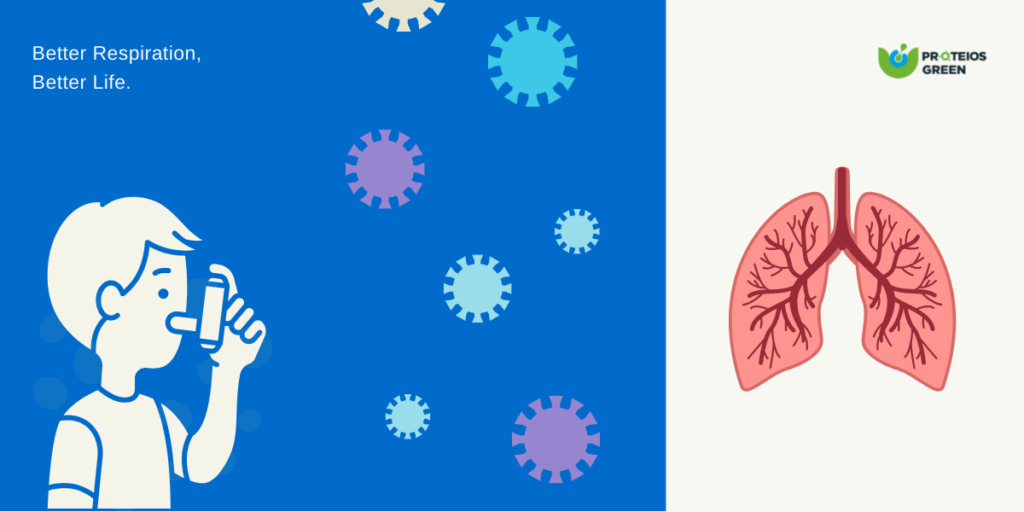- Health
Spirulina - A Systemic Medicine for Asthma and Allergic Rhinitis

Asthma is one of the major non-communicable diseases that are common among Adults and Children. WHO estimated that around 260 million people around the globe are affected by Asthma in 2019, and caused around 461,000 deaths. Asthma and Allergy Foundation of America reported that 25 million Americans were affected by Asthma in 2021, that is 1 out of every 13 Americans. AAFA also reported in 2022, that 50 million Americans experience Allergies every year. In India, it is estimated that 10 million people are affected by Asthma. Spirulina is well known for its anti-inflammatory properties and the studies show the evidence that Spirulina could be administered in the treatment of Asthma and Allergic Rhinitis.
Asthma and Allergic Rhinitis Cause and Symptoms
Asthma or Bronchial Asthma is a lung disease in which a person’s airways get narrowed and swell causing the production of extra mucus. It is a chronic medical condition and needs to be medically administered with concern.
Asthma makes a person’s breathing difficult by triggering cough and wheezing shortening the breath. Asthma may cause infrequent attacks lowering the oxygen flow in the body and when unattended might be fatal.
Allergic Rhinitis is also known as Hay Fever, which is an allergic disease caused when a person comes in contact with a specific Allergen that the person is allergic to.
Allergic Rhinitis is a common allergic disease that can be differentiated into Seasonal and Perennial. The common symptoms of Asthma and Allergic Rhinitis are,
- Cough
- Sore or Dry Throat
- Runny nose
- Stuffy nose
- Itchy nose
- Sneezing
- Excessive Fatigue
Spirulina, Asthma, Allergic Rhinitis, and Immunomodulation
When people suffering from Asthma and Allergic Rhinitis come in contact with a specific allergen that they are allergic to like a specific food, dust, etc, their body considers this a harmful threat, and as an immune response, their body releases histamine.
Histamine is an organic nitrogenous compound that is produced by basophils and mast cells of the connecting tissue. Histamine, when released as an immune response to specific allergens acts on the person’s eyes, nose, throat, lungs, skin, or gastrointestinal tract, causing allergy symptoms.
The allergic symptoms include Cough, Sore or Dry Throat, Runny nose, Stuffy nose, an Itchy nose, Sneezing, Excessive Fatigue, etc.
Spirulina is well known and worldwide accepted for its anti-inflammatory properties. Spirulina inhibits the release of histamine from mast cells, thereby reducing its effects on the body.
Changes in immunity happen because of the deficiency of nutrients in the body. Spirulina is a rich source of nutrients and is considered to be a Superfood worldwide.
It’s made up of 60-70% protein and has all the essential nutrients our body requires. Spirulina when consumed regularly promotes the production of T-cells, secretory Immunoglobulin A (IgA) antibody response, cytokines, and NK-cell activity.
These in turn suppress the inflammatory activity helping the person breathe comfortably and heal the tissues and cells internally. It is advised to intake 3 g of spirulina each day to get the required results however up to 10 g of Spirulina intake a day will furthermore boost anti-inflammatory activity in our body.


Itís difficult to find knowledgeable people in this particular subject, however, you seem like you know what youíre talking about! Thanks
Hey, simply trying around some blogs, seems a pretty good platform you are using. Im at present using WordPress for a few of my sites however seeking to change one among them over to a platform much like yours as a trial run. Anything particularly you would suggest about it?
Useful information
Very useful.lets try it
Immunity is most needed after Corona. This blog is the purpose for the human society of the world to beat infectious free world
We are serving society with a great product which can act as a rich protein diet, immuno booster, environment friendly, Non hazardous…etc.
We are on the right track.